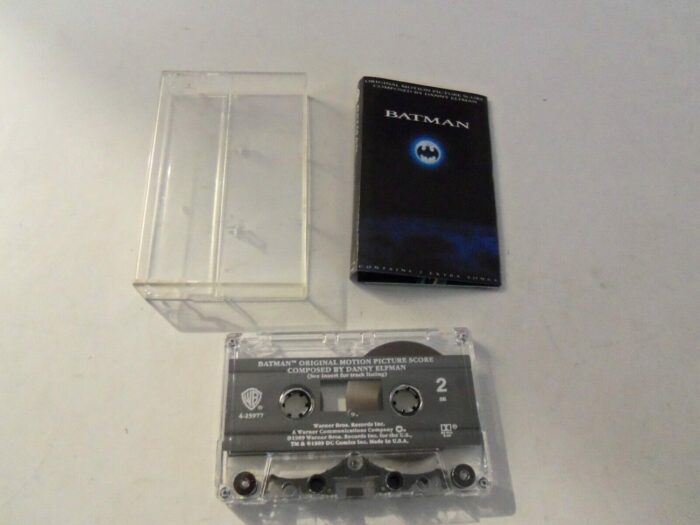My First Album

Batman is a musical mountain the greatest of composers must endure. Atop the mountain is the temple that many haven’t made. The original set of sticks was set by Danny Elfman’s 1989 theme to the caped crusader set a pinnacle for brooding superhero films to date. Elfman’s Batman is the opposite to John Williams’ feel-good Superman from 1978.
Batman’s 1989 melody has been remixed by Shirley Walker for the Animated Series and reimagined by Hans Zimmer for The Dark Knight Trilogy. Movies are about feelings. Without John Williams, E.T. going home, or Luke Skywalker looking towards the twin sunsets would be emotionless. For as good everyone’s Bat-score was post-Elfman, nobody’s made me feel the way Elfman’s did—until now. Michael Giacchino’s score to 2022’s The Batman is a heartfelt homage to Elfman’s melodies while establishing its own voice: one bombastic, terrifying, and heartbreaking.
Giacchino is one of Hollywood’s top composers. His work today is associated with big-budget blockbusters. He’s conducted Star Wars: Rogue One, the new Spider-Man trilogy, Doctor Strange, and has an Oscar for Pixar’s UP. And that only scratches the surface of his resume.
Although associated with multi million dollar films, my fondest memories of Giacchino’s work stems from his unconventional start in scoring video games. Or rather, how he transformed the medium. Working as a young producer for Universal at the time, Giacchino seized the opportunity to score the projects he was working on where he discovered his passion for music instead of producing. The first game that he composed was a game adaptation for Jurassic Park: The Lost World. Yet it wasn’t until Medal of Honor, that popularized orchestrally conducted games.
The Medal of Honor Days
For those unaware of the series, Medal of Honor is a 1999 first-person shooter for the Sony PlayStation. In the game, you play as Lieutenant James Patterson, a highly decorated soldier assigned by the office of strategic services to infiltrate Nazi-occupied land. When watching his son play Goldeneye, Spielberg hatched the idea for a first-person shooter featuring Saving Private Ryan’s setting, accuracy, and attention to detail. The result is a thrilling shooter that honors our veterans by pumping waves of Nazis with lead. After score The Lost World game, Spielberg chose Giacchino to conduct Medal of Honor under the condition that it be conducted with a true symphony.
An instrumentally conducted video game is standard nowadays but hearing it evolve in real-time is a blissful experience many won’t get to live. Before M.O.H., game scores were simplistic. Super Mario 8 bits of fun evolved to 16-bit harmonics. But it wasn’t until around the mid-90s where various companies like Panasonic and Sega started utilizing the Compact Disc format which opened the doors to limitless operatic possibilities. CD is what creates the audio data we hear today. On CD, the data stored on the lasers allowed for crystal clear audio to play in games matching the level of Hollywood films.
Twenty-three years since its release, Giacchino’s Medal of Honor scores live beyond the games they were composed for, as the soundtracks are ironically more readily available than the games themselves. During the upswing of the franchise’s career, Giacchino’s work for the original game is a thrilling rendition of patriotism mixed with adventure.
The first track of many
Entering the first mission, Rescuing The G3 Officer presents a sense of looming dread with its rising instrumentals. The music almost perfectly fits the level where you’re placed in a deserted field in the middle of the night. Beyond the distance, explosions continually ignite from another battle. The foreboding atmosphere piece captures the anxiety of entering hostile territory without assistance.
Since Medal of Honor, Giacchino continued to evolve as a composer, constantly challenging himself to make every game sound different. The Radar Train has a heroic ambiance that blends beautifully with the acoustics of Nazis chasing you in the sewers. Such a level of detail in the orchestral to video game arrangements complemented Spielberg’s demand for authenticity.
The eerie strings of Amongst The Dead in Medal of Honor: Underground is equally beautiful and terrifying, with the choral arrangements being the icing on top of the cake. Before Halo had its chanting monks, Medal of Honor had its foreboding choir for the second game’s underground level.
Transcending The Genre
The soundtrack that stands as the pinnacle for the series is Medal of Honor Frontline. The grandiosity in the score was Giacchino’s farewell as the permanent composer of the series; the original theme from the 99 game is reimagined from a heroic piece to something more provocative, paying tribute to the men who gave their lives on the front lines of war. The instruments start with a sizeable drum snare, followed by the voice of a young woman. Slowly a chorus chimes in until everything wraps with the familiar 1999 theme playing itself out ever so softly.
After The Drop is a sorrowful track resembling loss as the player scours a Dutch farmland overrun by Germans. More mournful is Arnhem Knights, a piece composed for a level placed in the devastated town of Arnhem, Holland. The arrangement consists of a child pleading through rough Dutch to English translation, “Oh my Arnhem, oh my Arnhem. Hold strong, Arnhem. Hold strong.” The pleas of the child are heard in the wistful track as the player battles through a town ravaged by death and madness—and something you wouldn’t expect to feel in a first-person shooter.
Years after the Medal of Honor franchise, Giacchino’s career is very much alive. Being a longtime fan of his work, I’m curious if The Batman will make Giacchino a household name as Batman did Danny Elfman. On occasion, Giacchino will score another Medal of Honor. However, I’m afraid Above and Beyond may be the final nail in the franchise’s coffin. Just remember, it wasn’t for Medal of Honor; Call of Duty wouldn’t exist.
Mike’s Soaring Score For The Bat
The Batman‘s theme is melancholic, masculine, and straightforward. The four-note structure is difficult to forget. With a few tings on the tips of the drums, a noir detective atmosphere is established. Then, the piece builds into an entire orchestral piece resembling sadness. Bruce’s loss plays fiddle to sorrowful strings that rise to a heroic anthem that ends on a massive note. When the horns reach the final rendition of its four-note structure, the speakers rattle with energy, barely able to handle the piece’s scale. Giacchino composes the perfect song that defines each element of Batman. A detective, a grieving child, and a symbol of fear for criminals fear, but inspires hope for their victims. However, Batman’s theme isn’t the only memorable song.
The Riddler’s theme bears similarity to MOH Frontline’s Arkham Knights, where a child’s singular voice hum’s in sorrow. The sadness you hear in the child’s voice serves as a bridge connecting Batman’s deceased family to the Riddler’s catastrophic upbringing. Catwoman’s song takes a measured approach starting with a piano solo (a rarity in Hollywood films nowadays) and transitioning to violins for a James Bond-inspired femme fetal tune. Secondly, the Cat’s 2022 theme plays a striking resemblance to Elfman’s Batman Returns‘ Catwoman tune. In both songs, the strings play off kilter for Cat woman’s use of sexuality to mascaraed her utter danger.
Throughout The Batman, Michael Giacchino tests the limits he can do with a genre’s music. Mixing between, heroic, disturbing, and melancholic, Giacchino’s score for The Batman miraculously works. Although multiple genres between, detective noir, to superhero, to horror, every piece blends seamlessly. From changing how video games can sound, Michael Giacchino variates the musical language in a superhero film, further exceeding his already impressive line of work. Giacchino is a pioneer for generating curiosity with his scores, never finding comfort with one sound. Here’s to that continued challenge to conduct greatness.
`


